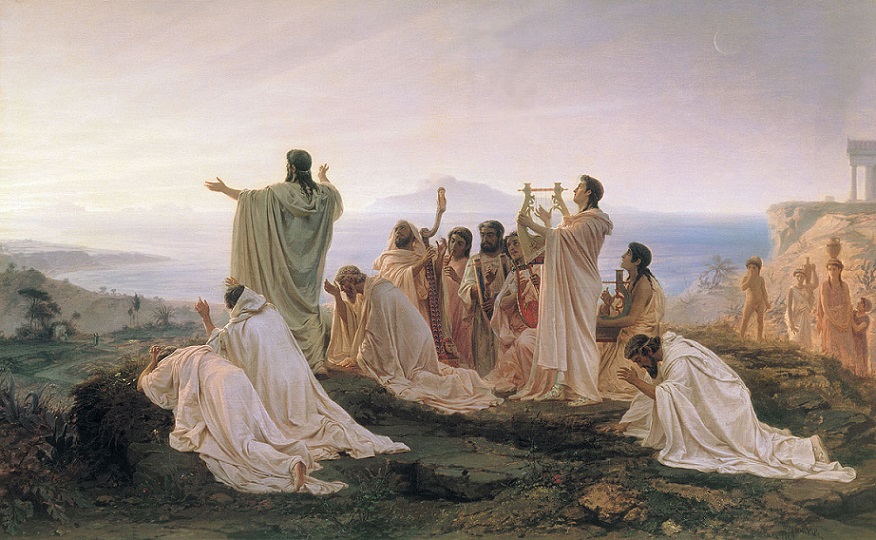.
Pythagoras, Man of Music
Pythagoras was of mathematical mind.
No matter where he went, he’d often find
Relationships to numbers. For example,
The clangorous peal of blacksmith hammers’ metal
On metal gave him cause to train his ear.
That different weights made different tones was clear.
He tested weighted strings of equal tension,
And soon discovered proof of correlation
Between the different lengths and sounds produced;
Results of which, he logically deduced,
Were ratios. Having solved a probing query,
By happy chance he furthered music theory!
.
.
The Musical Scale
Before Beethoven tickled the ivories,
Then wrote the Fifth and other symphonies;
Before Mozart ever scrawled a note
From chords and keys he learned by ear and rote;
Before there was a Brahm’s lullaby,
Tchaikovsky’s Suite, or Handel his Messiah;
Orchestral scores and movements operatic
As written by composers, most Germanic;
Who gave us classical music, so refined,
Which to this day appeals to humankind;
A Christian Benedictine monk, whose name
Was Guido d’Arezzo, thought about a hymn
To John the Baptist by scholar Paul the Deacon,
Which syllables were like a shining beacon;
Where each successive tone, in rising steps,
Agreed as well with seven holy concepts.
The most important, being Dominus,
For Lord, begins the scale with “Do”; thus
Began the art of musical notation,
Thanks to Guido’s ear for solmization!
.
Poet’s Note: In the early Middle Ages, around 1025 A.D., Guido d’Arezzo used opening syllables of the “Ut Queant Laxis” hymn to create a system for reading music. The hymn’s first stanza reads:
Ut queant laxis
Resonare fibris
Mira gestorum
Famuli tuorum
Solve polluti
Labii reatum
Sancte Iohannes
The seven concepts are: dоminus, rerum, miraculum, familias, solis, lacteal via, and siderae. In the 17th century, “Ut” became “Do”. Around 1827, “Si” was changed to “Ti” by English music educator Sarah Glover so that each syllable would begin with a different letter. While d’Arezzo didn’t invent notation per se (attempts date back to Mesopotamia, the ancient Greeks, and even Indian Sanskrit), he’s considered the founder of the modern musical staff, which led to the emergence of classical music.
.
.
Cheryl Corey is a poet who lives in Connecticut. “Three Sisters”, her trio of poems about the sisters of Fate which were first published by the Society of Classical Poets, are featured in “Gods and Monsters”, an anthology of mythological poems (MacMillan Children’s Books, 2023).




I LOVE the Pythagoras poem, Cheryl!
Any time you can bring together and harmonize Physics, Math, and Music … that’s a winning combination!
Thank you, Paul. The inspiration for the poems began with my reading of music-related poetry here at SCP. For some oddball reason I began to wonder who “invented” the scale, sheet music, etc., and so began the research which led me to learn about Guido d’Arezzo. I stumbled upon Pythagoras as I’m currently reading up on ancient Greece (d’Arezzo was familiar with the work of Pythagoras), and I wanted to write a second poem to accompany the one about d’Arezzo.
As a singer, I have so often thought of do, re, mi…yet never realized how that came to be. This is such a wonderful set of poems to explain how we got here musically. Pythagoras of all persons began the process. Your poems are a treasure.
Whether Pythagoras began the process or not, I don’t know; but I’m always fascinated by those individuals who have the lightbulb moments which result in huge leaps forward for civilization.
Thank you for this pair, Cheryl. The seven concepts, in association with Guido, are new to me. The connection between “ut”and “dominus” must be related to a lack of words beginning with u-t … Dominus, being “primus” is a convenient replacement, almost as if foreordained.
As an aside, there is a MacDonald’s on I-680 north of San Jose with a Guidonian hand painted on the wall.
As I understand it, the early Christian monks were very instrumental in the progression of our music.
They were indeed, and not only monks (singing, adapting, and writing chants for the Mass and Divine Office, eventually composing polyphony as well, and also active as theorists), but also other Church figures, many of them prominent, viz. Pope Gregory I, Isidore of Seville, Herman the Lame, Hildegard of Bingen et al.
Pythagoras is so musical.
He had very keen powers of observation and a good ear!
I enjoyed both and learnt much, thank you for these two delightful poems
I’m glad you like them.
Cheryl, thank you for these uplifting and educational poems. Through them I appreciate both men more than ever.
There are a great many men (and women) who throughout history have contributed so much, yet whom we appreciate too little!
How wondrous is the musical scale, and the great variety of information conveyed by a score in modern notation! Certainly worthy of your poem considering how classical composition depends on it. I still rely on my ear for melody and resist solmization, but the map of the staff helps me listen to other voices and refine my own part. Good memorials to Pythagoras and Guido, Cheryl, and like Julian, I thank you for noticing Guido’s seven concepts.
As the “Man of Music,” Pythagoras saw the world through the lens of harmony and balance. He believed that music, like mathematics, revealed the underlying order of the universe, providing a pathway to understanding both the cosmos and the human soul. His legacy lives on in the melodies that continue to move and inspire us, reminding us of the profound connection between music and the human experience.